Preservative Free Wine Guide (And Where You Can Buy It)
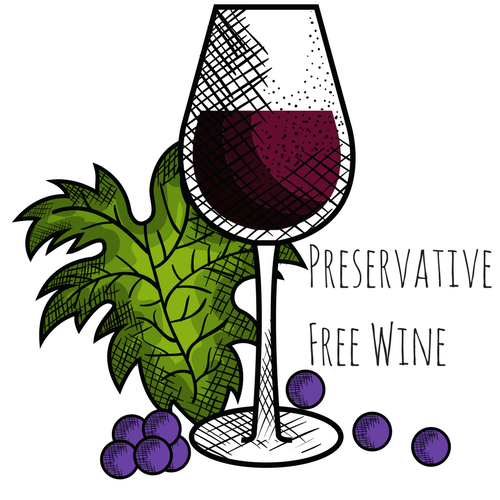
It’s so hard to know what’s going to be good or better for you, alongside what’s just hype or a buzzword when it comes to healthy living. When you hear the term ‘preservative free wine’ – what do you think? For me, I immediately think it must be better for me – the more natural a product is, the more I think it’s good for my health. So should we be drinking only preservative free wine?
A couple of years ago on the blog I actually did cover this topic slightly when I tasted and chatted to the guys from Freehand Wines. I used this opportunity to really understand the difference between all the terms like; preservative free, organic, biodynamic, natural wine etc. I’ll delve into these definitions further in this post.
If you’ve read the back of a wine label before you might have seen things like ‘contains sulfites’ or even ‘preservative free’ – but what exactly does this mean? Today I am going to explain these terms and wines to you and also suggest some ‘preservative free’ wines for you to check out for yourself.
What is preservative 220 in wine?
Sulphur Dioxide (SO2) is the main preservative used throughout the stages of making a wine. On a wine label, it can be sometimes be labelled as ‘preservative 220 added’ and I’ve also seen it labelled as ‘antioxidant 220 added’ – which makes it sound like a healthy vitamin to me (hook it up to my veins!). Go and check a few wine bottles in your house and I am sure you’ll see some sort of mention on the back label.
The maximum amount of sulphur that can be added to a wine in Australia is 300 mg/l as stipulated by Wine Australia. However, you’ll find most wines have a lot less than this and typically stick to 150mg/l and under.
It’s also important to understand that yes sulphur dioxide can be added to wine, but it can also be produced naturally by the yeast during fermentation. Therefore when winemaker’s do label their wines as ‘preservative free’ it more so means that they haven’t physically added in sulphur dioxide into the wine. Therefore perhaps on labels, it would be more accurate to write ‘no preservatives added’ instead.
What does ‘may contain sulfites’ mean?
If you have read the back of a few wine labels in your time, then you may have seen the phrase ‘may contain sulfites’ on the back of the label. The French Rose bottle I currently have in front of me says ‘contient des sulfites’ – despite failing French at school, I have a feeling this means the same thing.
SO2, HSO3 (bisulphite) and H2SO3 (sulphurous acid) are collectively called ‘sulfites’. The interesting thing is that wine producers never actually (well not that I have seen) ever disclosed exactly how much mg/l of sulfites are in the wine. If you have anything over 10mg/l of sulfites in the wine, then by law winemakers have to pop this fairly general term on the label.
Compared to the ‘olden days’ of winemaking, a lot fewer preservatives are added to wine as winemakers aim to produce the best quality fruit (the better the fruit and careful handling of it = the fewer preservatives you’ll need – more on this below). There are many wines out there which are very low in sulfites however from the label it’s hard to tell so some extra research is needed whether that’s doing a few Google searchers and checking out the winery’s website or perhaps reaching out to the winery on social media.
Why add preservatives to wine?
Sulphur dioxide is a good thing in winemaking – it helps the wine get to your palate in the best condition possible. It defends the grapes & wine against nasty bacteria’s and oxidisation. Just like we consume vitamins to keep us healthier for longer, we add SO2 to wine for longevity. I will touch on this more below, however, unless you suffer a reaction from sulphur dioxide there is really no health benefits to drinking only preservative free tipples.
This brings me to the point mentioned above – having the best quality grapes in pristine condition means a lot less sulphur dioxide needs to be added. Just prior to vintage and during vintage, you may drive past vineyards which have netting covering their vines – these nets are to help stop birds and pests damaging the grapes. The more damaged the grapes are at harvest, the more sulphur dioxide will be needed to produce an enjoyable and drinkable wine.
As you may also know, oxygen isn’t a good friend to wine – as soon as the wine has a large exposure to oxygen it will slowly (or quickly in some cases of very old wine) start to deteriorate. The sulphur dioxide during the winemaking stage will help neutralise any oxygen that may get near the wine so it can be bottled and sealed up for your delicious consumption.
How does wine last without adding preservatives?
This comes back to the natural preservatives wine makes on its own – alcohol, tannin (phenolics) and natural acidity. Red wine typically has more of these natural preservatives which is why you may see more preservative free red wines on the market than whites.
Plus you’ll also find that typically white wines do contain more sulfites/preservative 220 than red wine. This is because the tannin in red wines (which comes from when the grapes are in contact with the skins) contains natural sulphur dioxide. So if you are looking for a wine with low amounts of sulfites in, then heading towards the red wine aisle of your bottle shop might be wise.
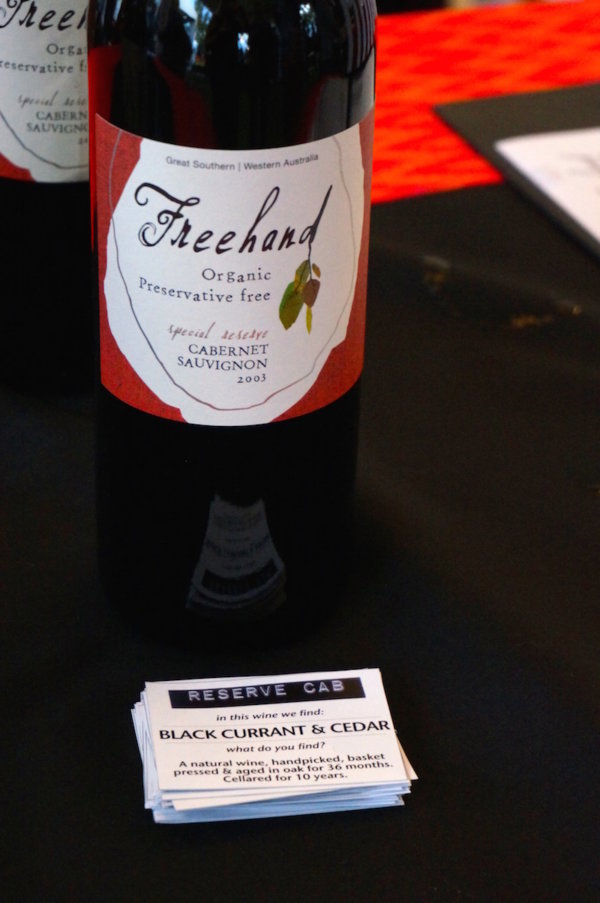
And again, the more the grapes are looked after in the vineyard prior to harvest – the easier they are going to be to turn into preservative free wine.
Is it the preservatives in wine that cause headaches?
This is always a very interesting topic and it is one of those wine myths that does need to be debunked every other day!
Technically sulfites don’t give you a headache. If you are allergic or to some degree intolerant of sulfites then you’ll more likely suffer from asthma or hayfever type symptoms (coughing, wheezing and that horrible tightening of the chest). You can read more about the symptoms of sulfite sensitiveness on ASCIA.
The funny thing is, dried fruit and a number of other foods typically have more sulfites in them than wine – see the below graph done by Wine Folly on measuring up sulfites in wine.
Therefore it’s safe to say, if you can eat dried fruit – like dried apricots, then sulfites in wine might not be what’s causing your issues.
In my post, Why Does White Wine Effect Me More Than Red Wine – I delve a bit further into why wine affects people in different ways. Headaches are more likely caused by the phenolics in wine or it could quite easily be the case of consuming too much alcohol in one sitting, drinking too quickly or not eating or drinking water while consuming alcohol.
The Sydney Morning Herald actually put together a great article on how sulfites shouldn’t be to blame but instead phenolics and the best wines to choose to help reduce those headaches.
How is preservative free wines made?
We have briefly touched on this above. Basically, the first step in making a wine without preservative 220 in, is to have the best quality fruit to work with. Using netting as explained above to keep the grapes in pristine condition right before harvesting is a good practice to ensure no damage comes to the fruit alongside harvesting the grapes by hand.
Naturally high phenolic content in the grapes is also a big help and again there are various vineyard practices that can be employed to enhance the phenolic levels in grapes. Basically, phenolics are an antioxidant that is good for heart health. Once the grapes are picked and ready for processing, keeping them nice and cool and away from as much air as possible will also help.
As Great Southern winery, Bunn, puts it:
Preservative free wines are made with utmost care and minimal intervention”.
Organic, biodynamic and natural wine must all be preservative free right?
These are all very different terms that mean different things. Just because a winery is organic, doesn’t necessarily mean the wines are preservative free.
Organic and biodynamic refers to vineyard practices. You’ll find many organic wines which still add sulphur dioxide in the winery (however typically a minimum amount). To gain organic certification, a vineyard simply has to adhere by certain vineyard practices.
Here are my quick definitions of these key terms:
- Organic wine: Means the wine is made by the principle of organic farming, which typically means the exclusion of herbicides, pesticides, fungicides and artificial chemical fertilizers in the vineyard
- Biodynamic wine: Biodynamic farming treats the vineyard as a living system. It’s the ideal of ever-increasing ecological self-sufficiency and ethical-spiritual considerations. Think soil fertility, healthy plant growth and working with the rhythms of the cosmos
- Preservative free wine: Preservative free wine, means that no preservatives were added during the winemaking process. However, the term doesn’t acknowledge that during the winemaking process sulphur dioxide is released which is a natural preservative. So we really should say ‘No preservatives added’ instead
- Natural wine: This has different meanings to everyone and the post I did on Freehand Wines helps define what exactly the term natural wine means
How do you know what wines are preservative free?
If a winemaker has put in all the effort to make a preservative free red or white wine, then you’ll know about it. It should be clearly mentioned on the front or back label and no doubt you’ll also be able to find further information online too.
How to find wines with low levels of sulfites:
If you are trying to avoid high levels of sulfites in your wine, then I would suggest
- Opting for red over white wine
- Avoiding cask wine (these tend to have high sulfite levels)
- Look for wines which say ‘no added sulfites’/’minimal added sulfites’/’preservative free’ on the label
- Or drink organic – even though being organic doesn’t necessarily mean they don’t use sulphur dioxide, I think you’ll find many organic winemakers use a lot less sulphur in order to keep their wines as ‘organically produced’ as possible
Preservative free wine brands:
There are a number of Australian wineries that are producing wines without preservative 220 in for various reasons. Some of the wineries I have come across in my travels include:
Disclosure: Please note, some of the links below are affiliate links, meaning, at no cost to you, I may earn a small commission if you click through and purchase.
- Battle of Bosworth (McLaren Vale, SA)
- Botobolar (Mudgee, NSW)
- Bunn (Great Southern, WA)
- Cullen Wines (Margaret River, WA)
- Freehand (Great Southern, WA)
- Happs (Margaret River, WA)
- Harris Organic Wines (Swan Valley, WA)
The Pedro Ximenez dessert wine is PF - Larry Cherubino Laissez Faire range uses very minimal amounts of sulphur (WA)
- Paxton (McLaren Vale, WA)
- Lowe Wines Preservative Free Shiraz (Mudgee, NSW)
- Settlers Ridge Wines (Margaret River, WA)
- Speak No Evil (Orange, NSW)
- Tamburlaine Wines (Hunter Valley & Orange, NSW)
- Temple Bruer (Langhorne Creek, SA)
- Thistle Hill (Mudgee, NSW)
- Wild Fox Wines (Adelaide Plains, SA)
- York Wines (Avon Valley, WA)
And I’ve also recently found out that wineArt Gallery is an online preservative free and organic bottleshop in Australia alongside organicwine.com.au who have over 55 preservative free wines available to purchase online.
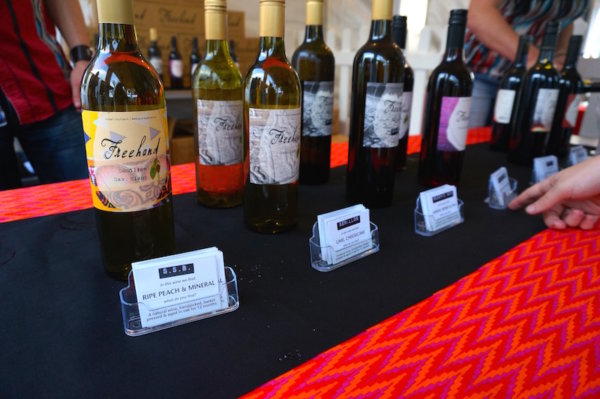
Please note, not all the wines produced by the above producers are preservative free however they do make some preservative free wines – please refer to the websites for more details.
Should we be drinking more preservative free wine?
Unless you have an allergy or are intolerant to sulfites/preservative 220 then there’s no huge need to drink only preservative free wine. At the end of the day it’s really up to you what you want to drink and enjoy – drink what makes you feel good.
However I do want to end this post on the note that, sulphur dioxide does aid hangovers – so if you do tend to indulge in wine a bit too much, then the more preservative free or low sulphur dioxide wine you can consume the better the next day might be for you. As More than Organic put it;
Sulphur dioxide contributes significantly to hangovers. Heavy drinkers who also have to get up in the morning would be advised to stick to natural wine”.
Perhaps that’s the best reason of all to opt for less preservatives in your wine right?

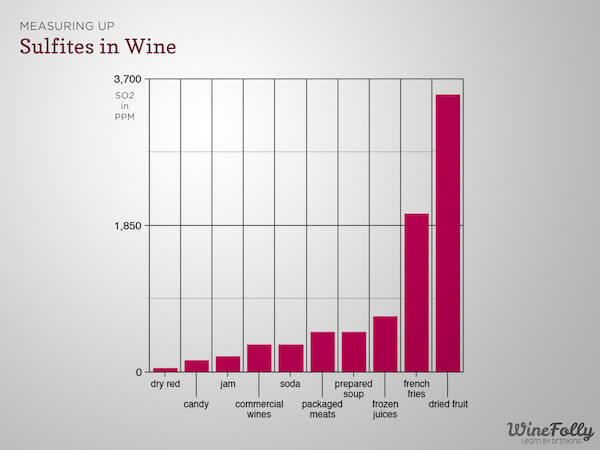
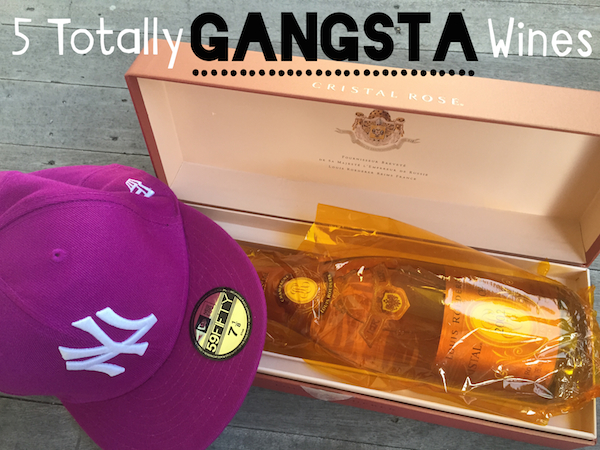

Thanks for the article. I have developed an intolerance to SO2 which I first realised eating a couple of dried apricots. My gums and lips started to bleed. Fresh apricots are okay. I then realised that SO2 is added to wine and tried preservative free wines. No headaches. It seems to be related to the amount I have at one time.
The general wine industry claim is that SO2 has no ill affect on people. Reminds me of the tobacco industry.
Hi Lisa, I am definitely not trying to insult you – sorry if you feel that way, definitely not my intention. Everyone to their own, headaches can be caused by many things, on a person-by-person basis. It could be something in the wine, it could be the person is already dehydrated and sadly but true for some people it can be overindulging. Thanks for sharing your thoughts and definitely stick to all those wines which don’t give you headaches 😉
“Headaches are more likely caused by the phenolics in wine or it could quite easily be the case of consuming too much alcohol in one sitting, drinking too quickly or not eating or drinking water while consuming alcohol.”
A HALF of a GLASS of some wines can give me a eye-throbbing headache. I think those wineries DUMP large quantities of sulfites in their wines since many (most) don’t give me headaches. Telling people they drink too much is both inaccurate and insulting. I think most people know there are naturally occurring sulfites in many foods but, like much of our processed food and drink, we add all sort of junk for “flavor” and “preservation”. Many are known to be detrimental, including nitrates, sulfites, MSG, artificial colors.
Hi Christine, thanks for your comment. I am pretty sure Jacobs Creek has some preservatives in however you could try Tamburlaine Preservative Free Pinot Gris from Orange, NSW or maybe Raw Vine Preservative Free Pinot Gris from Wrattonbully in South Australia. I hope this helps!
I am looking for Pinot Grigio without preservatives please ? which brands have them without preservatives? Does Jacobs Creek ?
I’ll have to do some digging for you Micky! Stay tuned and bookmark this post as I do add to it when I come across new ones 🙂
Would’ve loved to see more from Victoria. Why are we so far behind? Driving through Yarra Valley as we speak and would’ve easily pick up some preservative free wines.
Thanks for stopping by Erl and for clearing that up. I appreciate your knowledge on the subject and are a big admirer of your wines 🙂
I’m Erl Happ from Happs in Margaret River. I commend you on a comprehensive treatment of the subject. Only one misleading statement and its not your fault.
As a producer with long experience in this field I am aware that there is no sulphite produced in red ferments conducted on skins. Ever. The amount produced in white ferments is less than 10ppm that is below the level that requires a label acknowledgement. And that which is produced in a white ferment is totally bound and inactive so can do you no harm. So, the notion that ‘sulphite’, that might trigger a response in an allergic person, is naturally produced in fermentation and can’t be avoided, is not correct.
More sulphite can be produced (but again totally bound and incapable of hurting you) in problematic ferments where the odour of hydrogen sulphide is emitted. These days, that is rare because we are much more aware of what yeast needs to conduct a successful ferment.
A winemaker that knows his game can produce wine with minimal recourse to sulphur dioxide. There are ways and means to avoid its use and achieve an excellent result.
People should be aware that organic protocols allow the use of sulphur dioxide. Don’t assume that you are buying a sulphite free wine when the label says ‘Organic’, ‘Biodynamic’ or ‘Natural’.
Hi, Headache.. yeah..i don’t over indulge, I’m well hydrated and 2 glasses of merlot is my level , yet headaches still occur, often within 20minutes, if i drink wine that is not preservative free.. i was a teetotaller due to the headaches until i discovered tambourlain organic merlot by accident, so whatever they do it works, is it the preservatives, is it the phenolic, is it the 220 wish i knew, whatever it is i now hang out for and thoroughly enjoy my 2 glasses twice a week
thanks for the info…
Awesome thanks for the heads up on Tamburlaine Lisa Jane!
I look forward to testing a few of these. Also Tamburlaine Organic Wines are amazing & they have a preservative free range which is delicious & no headache!! I can get a headache from a sip of wine made with added preservatives but not with these! They are not widely available in chain bottle shops but direct from the vineyard online store & great member deals. You are welcome ?
https://tamburlaine.com.au/
Fantastic, thanks so much for the heads up on Lowe’s Keshnee, I’ll definitely add them 🙂
Add Lowe Wines Preservative Free Shiraz from Mudgee to your list 🙂 it really is a lovely everyday drinking wine that’s very well made! The rest of the Lowe range is very low in preservatives too (all organic, biodynamic, dry vines) hope to see you in Mudgee sometime!
Sorry to hear you’re a sufferer Jerry. Thank fully there are a number of tasty preservative free options out there for you. Thanks for stopping by and sharing your opinion – it’s always welcome on the TC blog 🙂
Wrong!! The author is a wine apologist. The sulfites definitely cause headaches. The worst thing to drink is champagne. For me, I can have one sip and count to five and I feel the headache starting. Wines also do this to me but it takes 10 to 20 seconds. Beer with preservatives also give me a hang over when I consume one can. Two cans is a major hang over. When I drink beer without preservatives I never get a head ache even if I consume 4 or 5 cans within a long evening or long afternoon. Believe it, its true and 30% of the population has a preservative intolerance. Most bartenders are totally unaware of the effect of preservatives….it is not well researched and not taught in bartender classes. Enjoy your hang over free days by taking my advice. I drink scotch, consume a lot, and never have a head ache or hang over.
I’ll check it out, thanks for the heads up Petah!
You maybe interested in our totally preservative free bottle shop, Wineart Gallery.
Brilliant thanks for the heads up Jane!
add Laissez Faire to the list – made by Larry Cherubino.
Thanks Trina! I’d definitely love to get over your way sometime soon. Thanks for stopping by the blog 🙂
Great post, well researched! Would love to see you in NSW. Cheers
Haha yes I agree Andrew – for many people it simply is the case of over-indulging!
Yes, thank you for writing this! Headaches are the funny thing that get danced around every time this comes up in conversation for me… you’re not getting headaches because winemakers are putting some mystical headache juice in your wine… you’re getting headaches because you drank too much and didn’t drink enough water while doing it. No magic there 🙂
Thanks for the feedback Kevin – glad you enjoyed it 🙂
Great article with tons of information. I’ll be referencing this in the future.
Sounds interesting Robin! From what I could see from Google ‘Maxwell Wines’ kept popping up, could this potentially be it?
Thanks for stopping by Allison, glad you found the info useful 🙂
Okay…off the subject slightly…I had a friend traveling and tasting in the McLaren Vale and he was at a winery or maybe someplace that made mead that also grew mushrooms in the cellar! I’m fascinated! Do you know where this might be?
Great article on this topic where there’s a ton of misinformation. We often get asked about this so bookmarking for future reference!
Thanks Robin! Yes I think it’s all about balance – I am pretty sure I could of wrote an entire post dedicated to wine headaches and phenolics!
Wonderfully informative! So I guess there is a balance to be found with the phenolics with sparking headaches and giving you those wonderful antioxidants!
Thanks Duncan and good to know about the Pedro – I’ll add it to the list 🙂
Great article Casey, just to let you know that Harris Organic Wines in Perth’s Swan Valley has preservative free Pedro Ximenez dessert wine available.
Thanks Pamela – hopefully it helps clear up a few misconceptions 🙂
Great roundup on the (often confusing and complex) topic!